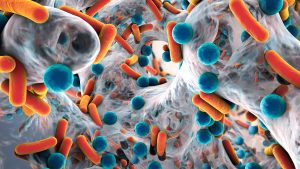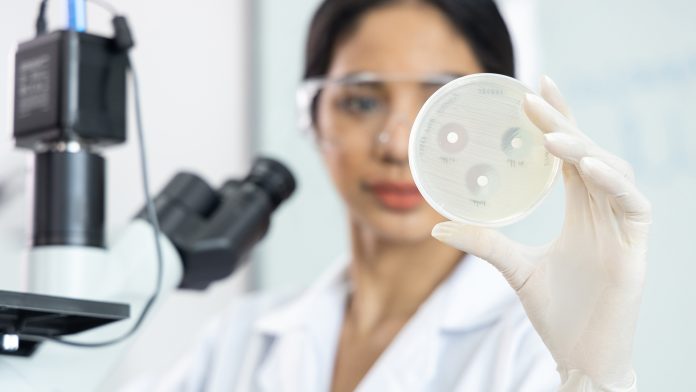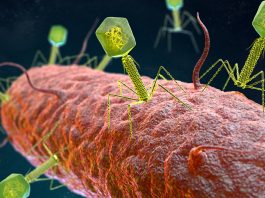Dr Louisa Jenkin, UKRI’s AMR programme lead, details UKRI’s key activities contributing to UK and global efforts to drive down antimicrobial resistance.
Antimicrobial resistance (AMR) – which occurs when pathogens stop responding to the antimicrobial medicines and products used to treat them – has become a major threat to human, animal, and plant health and the environment. The overuse and misuse of antimicrobials has led to a global increase in AMR, which is having detrimental effects.
With AMR becoming a rising threat to global public health, many countries worldwide have set out strategies and initiatives to address the issue and help reduce the occurrence of AMR. The UK is no exception and has had a national strategy and action plan in place to address antimicrobial resistance since 2000. The approach has been reinforced by various strategies since, most notably through the UK government’s 20-year vision set out in 2019 for “a world in which antimicrobial resistance is effectively contained, controlled and mitigated” by 2040.
Helping to deliver on the UK government’s AMR ambitions, the non-departmental public body UK Research and Innovation (UKRI) is driving many initiatives and projects in the AMR space across its nine research councils. The Innovation Platform Editor Georgie Purcell spoke to Dr Louisa Jenkin, who leads UKRI’s AMR programme, to learn more about these activities and how the organisation is driving research and innovation to combat AMR.
How do the actions and goals of UKRI align with the UK government’s strategy to reduce AMR?
In 2019, the UK government set out its 20-year vision to contain, control, and mitigate AMR by 2040. This is delivered through a series of five-year National Action Plans. We are now into the second National Action Plan, published in 2024. UKRI played a critical role in the development of that plan, and we worked closely with the Department of Health and Social Care (DHSC) and other government partners to help develop it, particularly around its top ten research priorities and how the plan could be supported by UKRI in the wider government funding. Those priorities align to the UKRI strategy and its tackling infections strategic theme, and were drafted with significant input from across UKRI to reflect the views of our wider AMR research community. The plan highlighted the fragmented research community across the human, animal, and plant sectors. They are not very well integrated, and their data, resources and learning aren’t well shared. It also stressed the importance of developing new tools and technologies and interventions using a fully integrated systems-based and what’s known as a ‘One Health approach’ to help tackle AMR.

UKRI has some specific commitments highlighted in the National Action Plan, and this is what the UKRI AMR programme will deliver. The first phase of the programme focuses on capacity building awards for transdisciplinary networks to help connect and expand the UK AMR communities. The second phase is for larger-scale, more focused research projects.
Can you explain some of the key ways that UKRI is working to tackle the issue of AMR?
We are building on a relatively large legacy, having previously conducted a lot of cross-council research on AMR.
We support AMR research and innovation through a variety of different mechanisms, including responsive mode funding, which has several funding rounds each year and is very open across the breadth of our remit. Each research council has its own responsive mode, but we also offer UKRI cross-council responsive mode funding to support interdisciplinary research projects that span two or more council remits. We also have targeted initiatives and strategic programmes, as well as international partnerships and collaborative partnerships with industry and other stakeholders.
Our collective and collaborative strengths mean we are able to provide interdisciplinary solutions that improve people’s lives and livelihoods. Of course, tackling AMR is one of those key challenges.
When we talk about AMR, a lot of the focus is on antibacterial. However, it is much broader than that – it includes fungi, viruses, and protozoa. The aforementioned One Health approach not only enables integrative and collaborative working across the different discipline sectors and communities, but also across humans, animals (including livestock, aquaculture, companion animals and wildlife), plants (including trees), both natural and manmade environments such as buildings and sewage systems, the food chain and the interplay with society and human behaviour, economics and policy. It’s all about co-designing research to inform and support the needs of our end users (policymakers, practitioners, clinicians, industry) and broader society.
What are some of the key projects/initiatives UKRI is investing in?
Our main programme is the UKRI AMR programme that I lead, which forms part of UKRI’s tackling infections strategic theme. Tackling infections is one of five UKRI strategic themes, and aims to prepare for future disease epidemics while halting the slow-moving pandemic of AMR. It’s about better understanding the issues and being able to detect and disrupt the emergence of AMR in animals, humans, and plants. The programme enables us to improve our understanding of where the threat lies and build the transdisciplinary research capacity to transform our thinking by applying a diverse range of methods, skills, and techniques.

As I mentioned, we have commitments within the National Action Plan, and we have already completed phase one of our programme. In July 2024, we invested £4.8m in eight new transdisciplinary networks, primarily to connect researchers from a broad range of disciplines and bring different stakeholders and sectors together, particularly encouraging underrepresented disciplines such as social science. It is about building and sharing knowledge and skills, and the networks we have supported cover a diverse range of sectors across the AMR landscape. These include agriculture; food; the environment; human and animal medicines; diagnostics; policy and behavioural studies; engineering; and social science. We also have a network dedicated to early career researchers, helping them to acquire the skills and experiences needed to help them become future leaders. These networks also have specific funding to help support small pilot or feasibility studies, and enable exchanges between academia, industry and other stakeholders.
We are currently preparing for phase two, which we hope to launch in March, to support the more focused, larger-scale transdisciplinary research projects. This phase is designed to have more of a solutions focus. It complements another UKRI activity, known as the PACE (Pathways to Antimicrobial Clinical Efficacy) programme. The £30m programme is supported by Innovate UK, LifeArc, and the Medicines Discovery Catapult. It brings together academics and SMEs, not only in the UK but worldwide, and provides funding, support and advice to build early-stage antimicrobial drugs and diagnostic projects, to accelerate the pre-clinical AMR pipeline.
We also have key international collaborations in place with our European partners, which are very important because pathogens and AMR don’t respect borders. The emergence of drug resistance in one country will very likely impact us all. Probably our largest European investment is the EU Joint Programming Initiative on Antimicrobial Resistance (JPIAMR). This partnership, which involves 29 countries, is all about supporting transnational projects. In addition, we recently collaborated with six countries in Southeast Asia in a multilateral partnership looking at infectious diseases with epidemic or antimicrobial resistance potential. We are gearing up to announce the outcome of this funding opportunity and are set to fund about 23 joint projects – 17 of which are in the AMR space.
Another key UKRI investment is the National Biofilms Innovation Centre (NBIC), which received a total investment of £16m from the UKRI Biotechnology and Biological Sciences Research Council (BBSRC) and Innovate UK between 2017 and 2022.
Microbes form slimy biofilms, which are a major cause of AMR. As an innovation and knowledge centre, NBIC connects academia, industry and policymakers to drive biofilm research and innovation, knowledge exchange and training with the aim of tackling global challenges.

In 2023, an independent review of NBIC highlighted significant benefits for the UK as a result of BBSRC and Innovate UK’s £16m investment, including a total economic impact of approximately £204m.
Can you elaborate on the progress of your work in this area so far?
The UK is a world leader in AMR research. A major success for us is our collaborative approach. Our strong involvement and support across multiple areas and in multiple countries has enabled us to influence the direction of various programmes and strategies, such as the UK government’s National Action Plan and the development of new European programmes.
What’s next for the direction of your AMR work?
Currently, we’re conducting an evaluation of the cross-council AMR initiative to help inform the direction of our funding from the government.
AMR is still a high priority for UKRI, and we will continue to support it through the various schemes that I’ve mentioned. We will also continue working on the National Action Plan, which we are heavily involved in the governance of. We chair the government’s AMR research steering group, which enables government funders and other stakeholders to co-ordinate and collaborate more effectively, but also to help agree evidence gaps and research priorities going forward and determine the most appropriate funding routes and infrastructure required to deliver those.
We’ve also funded our eight transdisciplinary networks, which have been running for around three to six months. We’re really interested in co-ordinating across those, looking for areas of synergy and building and linking them to our wider landscape. As I said, we’re about to announce our phase 2 that we’re very excited about.
We will continue to progress opportunities and develop our portfolio going forward, particularly with European and international partners to protect both human, plant and animal health. In Europe, we’re contributing to the development of a new European partnership on One Health AMR. The ten-year programme is due to start at the end of 2025 and we’re going to be involved in that.
We are also working to hopefully secure future funding to continue building momentum in AMR research with a particular focus on expanding activity in fungal disease and on realising the opportunities from a ‘planetary health’ perspective, for example crop disease risks and social and behavioural research.
Please note, this article will also appear in the 21st edition of our quarterly publication.









